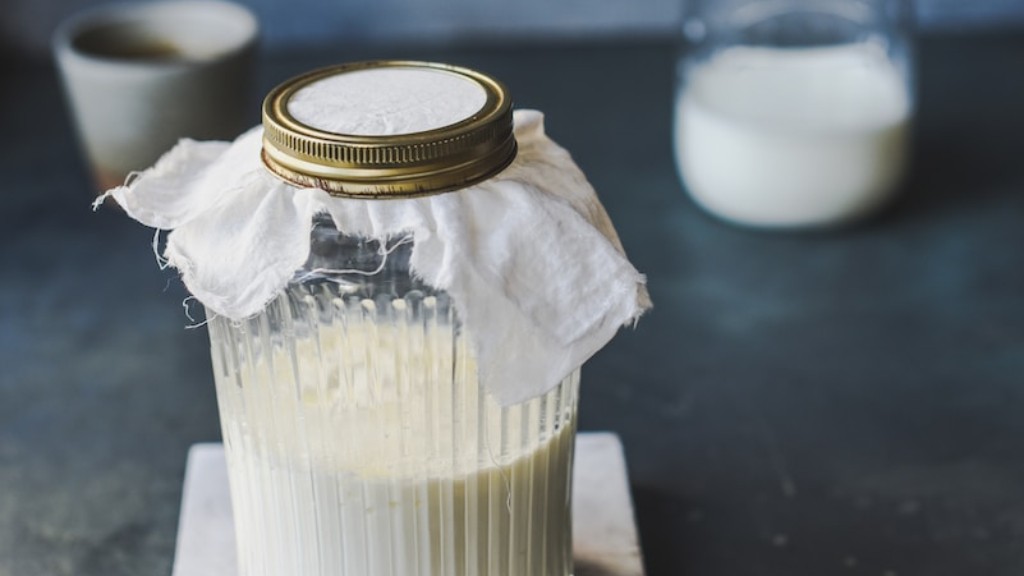Milk is one of the most popular beverages out there, and it’s often recommended as part of a healthy diet. But some claim that drinking milk can increase mucus production. So, does milk make more mucus? Let’s take a closer look.
There is still some debate on this topic, and there hasn’t been much conclusive research done. But, many suggest that milk can make mucus thicker for some people, leading them to produce more of it. In fact, doctors have been recommending against drinking milk for many years to help reduce the amount of mucus in the respiratory system. This doesn’t mean that everyone should avoid milk, as some people don’t experience these effects at all.
One potential reason why milk might lead to the production of more mucus is because of its high fat content. Fatty substances can cause our bodies to create more mucus, which can in turn increase congestion and irritation. Other substances like dairy products can have the same effect. For example, cheese and yogurt contain high amounts of fat, which can cause mucus to form. Even if you don’t suffer from allergies, these foods can still make congestion worse.
It is also possible for milk to worsen allergies in some people. This is because proteins in milk are similar to allergens, and drinking milk can activate the body’s response to the allergen. This response triggers the production of mucus and other symptoms, such as sneezing, coughing, and nasal congestion. In some cases, avoiding milk might be the best thing for people with allergies.
If you’re concerned that drinking milk might worsen your mucus symptoms, you don’t have to give it up entirely. Instead, you can try replacing full-fat milk with semi-skimmed or skimmed milk. Most people who experience an increase in mucus after drinking milk, also experience reduced symptoms when switching to these lower-fat variations. However, this isn’t a guarantee, as some people still experience symptoms even with these options.
Overall, there is still a lot to learn about the effects of milk on mucus production. Research has yet to provide a definitive answer, so it’s important to listen to your body and experiment to find what works best for you. If you notice that milk is causing your mucus symptoms to worsen, then it’s best to avoid it and consult your doctor if necessary.
Can Anything Reduce Mucus Production?
Although milk can increase mucus production for some people, there are some things that you can do to reduce the amount of mucus. For example, drinking plenty of fluids can help to thin the mucus and make it easier to expel. This is why drinking water is recommended for anyone suffering from a cold or other respiratory infection. You should also drink herbal teas, as these can help soothe the throat.
It’s also important to get plenty of rest and to take medications that are specifically designed to reduce mucus production. Antihistamines are often used to reduce the amount of mucus in the body, and a doctor might prescribe these for more severe allergies or colds. It’s also important to avoid smoking, as this can cause additional irritation and inflammation in the lungs that will increase mucus production.
Lastly, it’s important to be aware that allergies can also be a major cause of mucus production. Allergic rhinitis, or hay fever, is a very common condition that can cause a stuffy nose and excessive production of mucus. If you think that you might be suffering from an allergy, it’s important to visit your doctor to find out for sure.
What Are the Benefits of Milk?
Although milk can have a negative effect on some people, it can still have many benefits. For example, milk is a great source of protein and will help to keep you feeling full for longer. It’s also an excellent source of calcium, and most adults should drink at least 2-3 glasses a day to meet their daily calcium needs. Cow’s milk is also fortified with vitamins, so it can be a great addition to your diet.
Milk can also be beneficial for people with allergies to certain foods like soy or almond milk. This is because cow’s milk is considered to be hypoallergenic, meaning that it generally doesn’t cause allergic reactions. This also makes it easier for people to get the nutrients they need if they can’t tolerate other types of milk.
Lastly, low-fat milk is a great way to get the benefits of milk without the added fat. Low-fat milk has the same nutrients as regular milk, but with fewer calories and less fat. This makes it a great choice for people who are trying to watch their weight or maintain a healthy diet.
Drinking Milk in Moderation
Overall, most people can drink milk without any issues. However, if you’re experiencing any type of mucus-related difficulty, then it might be best to avoid it or switch to a lower-fat alternative. It’s also important to be aware of allergies and listen to your body if you’re feeling symptomatic.
Milk can also be beneficial in moderation. As long as you’re not exceeding the recommended amount, then it can make for a great addition to your diet. Before increasing your intake of milk, be sure to speak to your doctor or a nutritionist to make sure that it’s the right thing for you.
Are There Alternatives to Milk?
If you decide that it’s best for you to skip the milk altogether, then you don’t need to worry. There are plenty of other options out there that can provide the same nutritional benefits. For example, almond and soy milk are both fortified with vitamins and minerals and are much lower in fat than cow’s milk. There are also plenty of other plant-based milks made from oats, hemp, and coconut.
If you’re avoiding milk because of allergies, then there are some hypoallergenic alternatives out there. Rice milk and hemp milk are both hypoallergenic and have similar nutritional benefits to cow’s milk. Coconut milk is another option, but it is slightly higher in fat and calories.
Overall, there are plenty of options out there for people who want to avoid milk. Whether it’s due to allergies or personal preference, there are plenty of alternatives that can provide the same nutrients without the same risk of increased mucus.
Final Word
So, does milk make more mucus? This is still a subject of debate, and more research is needed to get a definitive answer. However, it is possible that milk can make mucus thicker and increase symptoms of congestion for some people. If this is the case for you, then it’s best to try reducing your intake of milk or switching to a lower-fat alternative. If this doesn’t help, then be sure to speak to your doctor about other ways to reduce mucus production.



